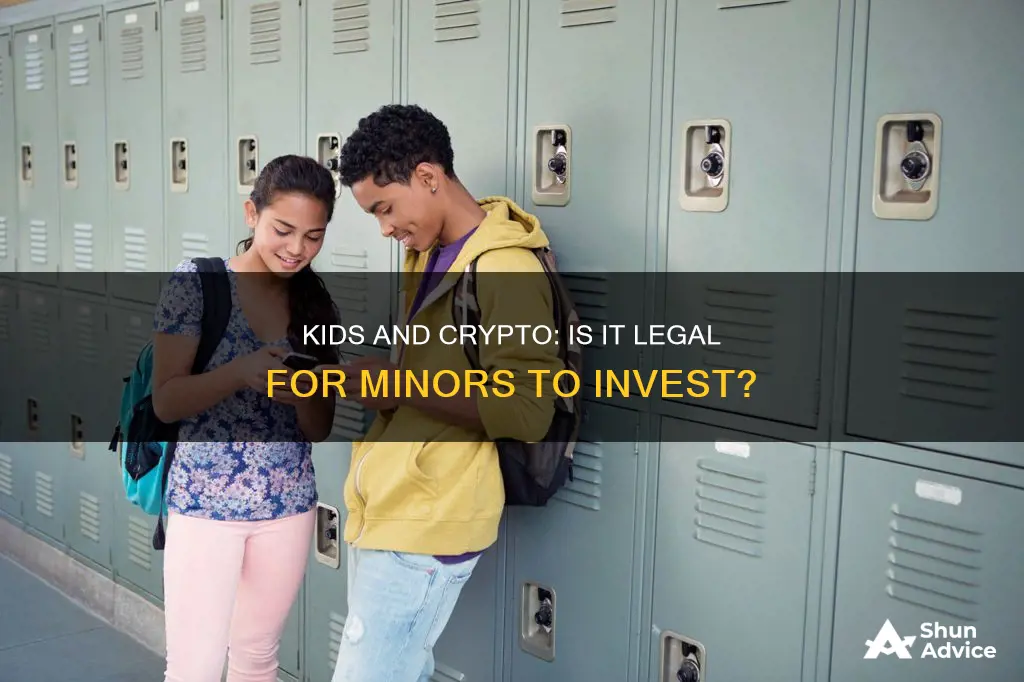
Investing in cryptocurrencies is a risky and volatile endeavour, but it can also be a great way to teach children about financial planning and investing. While there are no laws preventing minors from investing in cryptocurrencies, many exchanges require users to be 18 or older. This means that, in most cases, children will need help from a parent or guardian to invest in crypto.
| Characteristics | Values |
|---|---|
| Minimum age requirement to own cryptocurrency | None |
| Crypto platforms that allow children to buy crypto | None |
| Crypto platforms that allow adults to buy crypto for children | Coinbase, Binance.US, UNest, EarlyBird, UGMA, UTMA, Step |
| Type of account that allows children to earn crypto without directly buying it | Custodial account, joint account |
| Apps that let kids earn crypto | Step |
| Crypto wallet for children | Cold wallet, hot wallet |
| Crypto wallet providers | Trezor, Ledger Nano, Coinbase, Electrum |
What You'll Learn

Why can't kids buy crypto?
While there is no minimum age requirement for minors to own cryptocurrency, most crypto platforms, including traditional brokerage firms, won't allow children to buy crypto until they become adults. This is mainly due to Know Your Customer (KYC) laws, which require financial institutions to verify the identity of their customers before allowing them to make transactions, in order to prevent money laundering and other illicit activities. Since minors often don't have government-issued IDs, they are unable to comply with these laws and are therefore restricted from using most crypto exchanges.
Additionally, crypto investing is considered high-risk and mostly unregulated, so it is generally advised that minors invest only what they or their parents are willing to lose.
Cryptocurrency and Taxes: Understanding Your Crypto Investments
You may want to see also

How can parents invest in crypto for their kids?
The crypto sector is valued at over $2 trillion, with the value of Bitcoin exceeding $44,000. Cryptocurrencies like Bitcoin and Ethereum are highly valued, while others like Dogecoin can be more volatile. Crypto is pushing the boundaries of technology and investment, so it can be a good opportunity to teach children about financial literacy.
Crypto is a volatile asset, and parents may be hesitant to include it in their child's portfolio. To manage this volatility, parents can consider factors such as time horizon, risk tolerance, and diversification. Crypto investments may be held for a longer period compared to traditional investments like stocks and bonds. Parents should also assess their risk tolerance and ensure the portfolio is diversified to reduce overall volatility.
How to Invest in Crypto for Kids
Since children cannot directly buy cryptocurrencies, parents need to take the following steps:
- Decide where to buy cryptocurrency, such as cryptocurrency exchanges or traditional brokerages.
- Choose a place to store the cryptocurrency, either in a hot wallet or a cold wallet.
- Purchase the cryptocurrency by depositing traditional currencies into the account. It is possible to buy fractional shares.
- Monitor the investment and hold it for the long term.
How to Explain Crypto to Kids
Explaining crypto to children can be challenging as it is a digital and abstract concept. Parents can start by relating it to something tangible, like a piece of art, and explaining how blockchain technology ensures secure transactions. They can also highlight the growing acceptance of crypto by companies like Microsoft, Starbucks, and Wikipedia.
Risks and Benefits of Crypto for Kids
Crypto is a high-risk and volatile investment, and parents should be aware of the potential losses. However, it offers an opportunity to teach children about investing, risk management, and financial literacy. It can also provide exposure to new technologies and economies.
Types of Kid-Friendly Crypto Products and Companies
There are various cryptocurrencies to invest in, including Bitcoin, Ethereum, and Dogecoin. Fractional shares can also be purchased. Parents can open custodial accounts or use crypto wallets to manage their children's crypto assets.
Cryptocurrency Investments: A Beginner's Guide to Getting Started
You may want to see also

What are the benefits of early investment?
Investing early in life can have several benefits. Here are some reasons why starting early can be advantageous:
Compounding Effects
Albert Einstein referred to compounding as the "eighth wonder of the world", and for a good reason. Compounding, or earning interest on interest, can cause one's wealth to grow exponentially over time. The earlier one starts investing, the longer the time horizon for reinvesting earnings, and the larger the final amount. For example, a single $10,000 investment at age 20 would grow to over $70,000 by the time the investor turns 60 (assuming a 5% interest rate). Waiting 10 years to make the same investment would yield about $43,000 by age 60, and starting 20 years later would result in only $26,000.
Risk Tolerance
Young investors can afford to take on more risk in their investment portfolios. While older investors approaching retirement age may opt for low-risk or risk-free investments such as bonds and certificates of deposit, younger investors can build more aggressive portfolios that are subject to more volatility but also have the potential for larger gains. Additionally, young investors have more time to recover from any investment losses.
Enhanced Learning and Adaptability
Investing early in life provides a longer period to study investing, learn from mistakes, and refine strategies. The lengthy learning curve in investing can be better navigated by younger investors who have more time to adapt and make adjustments.
Higher Risk Appetite
When individuals are younger, their risk appetite tends to be higher. This puts them in a better position to invest in high-risk products such as equities or equity mutual funds, which may provide returns higher than inflation. On the other hand, starting to invest later in life may lead to choosing lower-yielding, safer investment options.
Improved Spending Habits
Early savings and investment habits can positively impact one's spending patterns. Creating a monthly budget to save a certain amount from a fixed paycheck helps track expenses and encourages better spending decisions. Over time, this discipline becomes second nature and contributes to long-term financial health.
China's Crypto Ban: Where to Invest Now?
You may want to see also

How can kids invest in crypto?
This is mainly due to Know Your Customer (KYC) laws. In most jurisdictions, KYC laws require financial institutions to verify the identity of their customers before allowing them to make transactions, in order to prevent money laundering and other illicit activities. As crypto exchanges are not allowed to onboard customers without a government-issued ID, and these documents are generally not available to minors, many crypto exchanges do not allow children to open accounts.
Parents can open a crypto exchange account and buy cryptocurrency for their child, transferring the funds to a personal wallet. It is recommended to hold the tokens in a cold wallet on the child's behalf. A cold wallet is a secure offline storage medium, typically a portable USB device, which is not exposed to hacking attempts.
Once the child turns 18, parents can then gift the hardware wallet or private keys to the child, giving them control over the assets.
A custodial account is an adult-managed investment account that allows a parent or guardian to open an account on behalf of a child. The assets legally belong to the child, but the account is managed by the adult. A common example is the UGMA (Uniform Gifts to Minors Act) account, offered by UNest and EarlyBird.
Crypto investing is considered high-risk and mostly unregulated. It is subject to extreme price volatility, and investors can lose most or all of their money. Regulatory uncertainty is also a factor, as some governments may restrict the use of cryptocurrencies or ban them outright. Scams and hacks are also common, and there is a higher risk of fraud than with most other assets.
Cryptocurrency is seen by many as the future of finance, and it offers a way to teach children about financial planning and investing. The power of compounding means that investing early can lead to huge returns. As cryptocurrency is a new asset class, there is a lot of growth potential as more people adopt and use it.
The Ultimate Guide to Investing in Dogecoin
You may want to see also

What are the risks of investing in crypto?
While investing in cryptocurrencies can be an attractive option for many, it is essential to understand the associated risks. Here are some key points to consider:
Volatility and Price Fluctuations
Cryptocurrencies are highly volatile, experiencing rapid surges and crashes in value. This volatility is driven by various factors, including the constant evolution of government regulations, which may differ based on geographical location. The lack of central authority backing, such as a government or central bank, further contributes to price fluctuations.
Regulatory Uncertainty
The crypto industry currently operates with relative freedom from regulation. However, there is a risk that governments will impose restrictions or even ban certain cryptocurrencies. Such actions could significantly impact the value of investments.
Security Risks and Scams
Cryptocurrency transactions are irreversible, and there are no legal protections or insurance for lost or stolen cryptocurrencies. Scams and hacks are prevalent, and investors must be cautious to secure their crypto wallets, exchange accounts, and other crypto apps.
Lack of Protections and Guarantees
Cryptocurrencies are not insured by governments or protected by legal entities like credit cards and bank accounts. There are no guarantees of making money from crypto investments, and the value can change constantly and dramatically.
Fraud and Market Manipulation
The complex nature of the crypto space makes it susceptible to fraud and market manipulation by influential people, organizations, and exchanges.
High Energy Consumption
Mining popular cryptocurrencies requires significant energy consumption, sometimes comparable to the energy usage of entire countries.
Criminal Activities
The pseudonymous nature of cryptocurrency transactions enables their use in criminal activities, such as money laundering and illicit purchases.
Management Risks
The lack of coherent regulations leaves investors vulnerable to deceptive or unethical management practices, resulting in financial losses.
Programming Risks
The use of automated smart contracts in investment and lending platforms introduces the risk of bugs or exploits that could lead to investment losses.
In conclusion, investing in cryptocurrencies carries significant risks, including volatility, regulatory uncertainty, security threats, and a lack of protections. It is crucial to thoroughly educate oneself about these risks before deciding to invest in cryptocurrencies.
Bitcoin: Understanding and Investing in Cryptocurrency
You may want to see also
Frequently asked questions
Kids can invest in crypto with the help of an adult. Most exchanges require users to be 18 or older due to KYC standards.
The main reason is Know Your Customer (KYC) laws, which require financial institutions to verify the identity of their customers before allowing transactions, in order to prevent money laundering and other illicit activities. Crypto exchanges collect government-issued IDs, which minors don't have access to.
Parents can open a crypto exchange account and buy cryptocurrency for their child, transferring the funds to a personal wallet. They can also use a custodial account, which is held by a third party on behalf of the account holder.
Yes, you can open a custodial account, joint account, or another type of account that allows the child to earn crypto without directly buying it.







